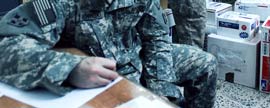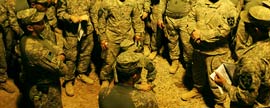SOCIAL MEDIA FOR LEADERS
Social media has improved the way we connect and communicate as a culture, but it presents some interesting dilemmas for Army leaders.
ONLINE RELATIONSHIPS
Social media is about connecting, so it’s only natural that Army leaders may interact and function in the same social media spaces as their subordinates. How they connect and interact with their subordinates online is up to their discretion, but it is advised that the online relationship function in the same manner as the professional relationship.
SHOULD SOLDIERS “FOLLOW” THOSE IN THEIR COMMAND?
This is also left to the discretion of the Army leader. Ultimately, it depends on how that leader uses social media. If the leader is using social media as a way to receive command and unit information along with installation updates, then following members in a leader’s command is appropriate. But if the leader is using social media as a way to keep in touch with family and friends, it may not make sense to follow people in the leader’s chain of command
LEADER CONDUCT ONLINE
When in a position of leadership, conduct online should be professional. By using social media, leaders are essentially providing a permanent record of what they say, so, if you wouldn’t say it in front of a formation, don’t say it online. If a leader comes across evidence of a Soldier violating command policy or the UCMJ on social media platforms, then that leader should respond in the same manner they would if they witnessed the infraction in any other environment.
SELF PROMOTION
Using rank, job, and/or responsibilities in order to promote oneself online for personal or financial gain is not appropriate. Such actions can damage the image of the Army and an individual command.
PAID SUBMISSIONS
Treat requests from nongovernmental blogs for a blog post as a media request and coordinate with your public affairs officer. It is against Army regulations to accept
compensation for such posts.
POLITICAL DISCOURSE
Everything a leader says and does is more visible and taken more seriously. Leaders have a greater responsibility to speak respectfully and intelligently about issues they don’t intend to reflect on a command or the Army.
Note: Taken from the U.S. Army Social Media Handbook
Please Read! Help Us Help Others!
If you think this site is useful please tell your peers, subordinates, and superiors. Also we are always looking for examples, classes, briefings, SOPs, templates and other information we can share for free in the ASKTOP.net Armsroom. Please help us help others by sending your ARMS ROOM stuff to: mark.gerecht@mentorinc.us













